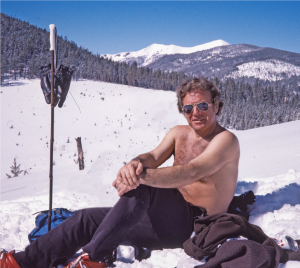We are sad to report that Dr. William (Bill) Dewey passed away on November 15. There are probably only a few people here at CSU that remember that Bill was the driving force behind the creation of the CMB program. In about 1967, several faculty members from different departments started a graduate course in cell biology that had no formal support structure. In 1974, a group of 20 faculty signed the CMB charter document that Bill channeled through the university administration to obtain funding to support a seminar program in Cell and Molecular Biology and a part-time program administrative assistant. The new CMB faculty revamped the two-semester (10 credit) graduate course and added a course coordinator to help organize and better integrate the content. New five-week lab modules were also developed, some of which were offered for more than 30 years.
Bill was born in Omaha Nebraska. His father was a physician in the Army and the family moved frequently. He attended five different high schools and then attended the University of Washington where he graduated Phi Beta Kappa in 1951 with a B.S. degree in Physics. Fulfilling his obligation to the NROTC program, he then spent three years as a junior officer in the Navy where he was assigned to an aircraft carrier, and was designated as the “Atomic, Biological and Chemical Warfare Defense Officer”. He thought this interesting and when he left the Navy, he enrolled in a Ph.D. program at the University of Rochester where he studied tumor immunology and explored the possibilities of delivering radioisotope labelled anti-tumor antibodies to tumors. In 1958, he took a faculty position at the MD Anderson Hospital in Houston where he ran the clinical radioisotope lab. His research interests expanded, and he soon was awarded NIH grants for studies on the effects of radiations on cells with a particular focus on cell cycle effects
In 1965, Bill moved to Colorado State University, to join a newly established department of Radiology and Radiation Biology. The program was greatly enhanced with Bill’s participation and expanded studies on somatic cell mutagenesis and chromosome damage as well as cellular responses to hyperthermia and heat-shock. He was particularly interested in factors underlying differential effects of these agents on tumor and normal tissues in relation to cancer treatment strategies. Bill was very supportive of other complementary sections in the department, such as radioecology, and delighted in telling visitors that “…our department studies radiation effects on everything from the molecule to the biosphere!” About 1980, thanks to Bill’s own research programs and the programs of faculty he was largely responsible for recruiting, mentoring, or collaborating with, the department ranked first among all CSU departments in federal research and training support per faculty member.
Times change, but Bill Dewey’s example remains constant. He was always enthusiastic about establishing productive collaborations among faculty within departments, between departments, and between faculty in different colleges. Nothing bears witness to this more than his work leading toward the eventual development of our current CMB program. Even after his CSU retirement in 1989, Bill remained very active through an appointment at the University of California, San Francisco, publishing more than 60 papers, ending in 2009 when turned 80.
Comments about his death should be sent to:
GRAD_CellMoBio@colostate.edu

